新职业英语素质篇unit2
- 格式:ppt
- 大小:6.29 MB
- 文档页数:77

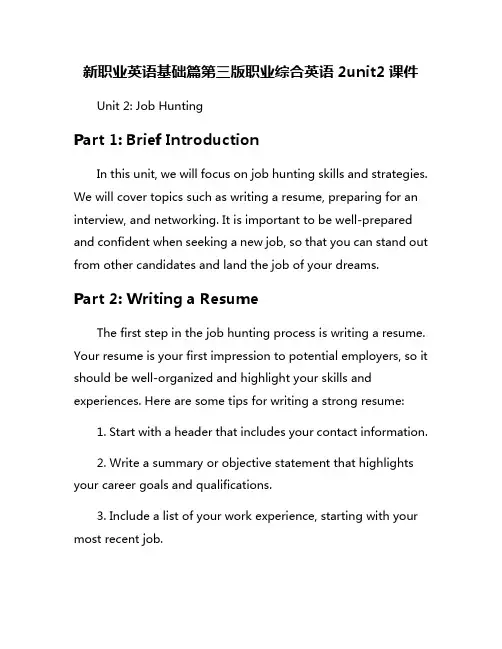
新职业英语基础篇第三版职业综合英语2unit2课件Unit 2: Job HuntingPart 1: Brief IntroductionIn this unit, we will focus on job hunting skills and strategies. We will cover topics such as writing a resume, preparing for an interview, and networking. It is important to be well-prepared and confident when seeking a new job, so that you can stand out from other candidates and land the job of your dreams.Part 2: Writing a ResumeThe first step in the job hunting process is writing a resume. Your resume is your first impression to potential employers, so it should be well-organized and highlight your skills and experiences. Here are some tips for writing a strong resume:1. Start with a header that includes your contact information.2. Write a summary or objective statement that highlights your career goals and qualifications.3. Include a list of your work experience, starting with your most recent job.4. List your education, including any degrees or certifications you have obtained.5. Include any relevant skills or qualifications that make youa strong candidate for the job.6. End with a list of references who can vouch for your skills and experiences.Part 3: Preparing for an InterviewOnce you have submitted your resume and been called for an interview, it is important to prepare thoroughly. Here are some tips for preparing for an interview:1. Research the company and the job position you are applying for.2. Practice answering common interview questions.3. Dress appropriately for the interview.4. Bring a copy of your resume and any other relevant documents.5. Prepare questions to ask the interviewer.6. Follow up with a thank-you note after the interview.Part 4: NetworkingNetworking is an important part of the job hunting process. By connecting with industry professionals and building relationships, you can increase your chances of finding job opportunities. Here are some tips for networking:1. Attend industry events and job fairs.2. Join professional organizations related to your field.3. Connect with professionals on LinkedIn.4. Reach out to former colleagues and classmates for job leads.5. Be proactive in seeking out networking opportunities.Part 5: ConclusionJob hunting can be a challenging process, but with the right skills and strategies, you can increase your chances of finding a job that is a good fit for you. By writing a strong resume, preparing for interviews, and networking effectively, you can stand out from other candidates and land the job of your dreams. Good luck!。

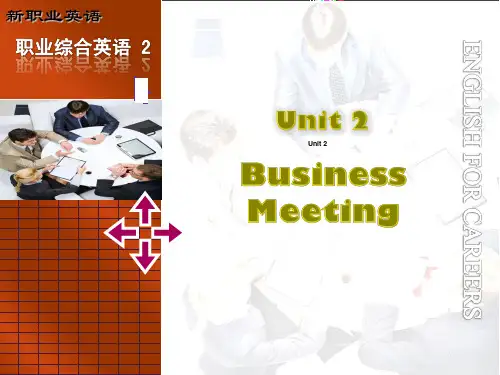

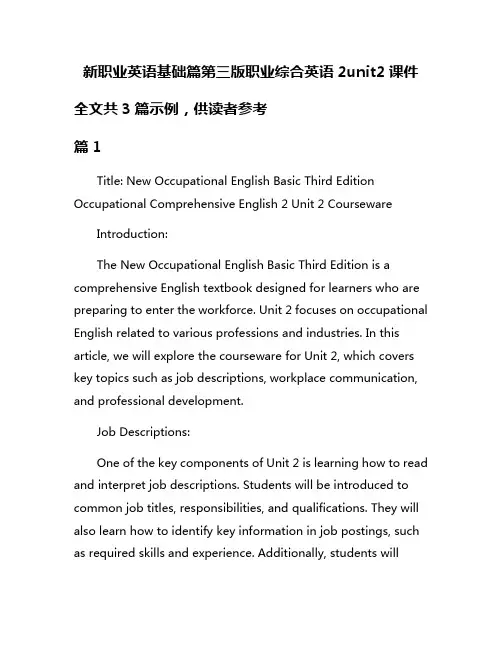
新职业英语基础篇第三版职业综合英语2unit2课件全文共3篇示例,供读者参考篇1Title: New Occupational English Basic Third Edition Occupational Comprehensive English 2 Unit 2 CoursewareIntroduction:The New Occupational English Basic Third Edition is a comprehensive English textbook designed for learners who are preparing to enter the workforce. Unit 2 focuses on occupational English related to various professions and industries. In this article, we will explore the courseware for Unit 2, which covers key topics such as job descriptions, workplace communication, and professional development.Job Descriptions:One of the key components of Unit 2 is learning how to read and interpret job descriptions. Students will be introduced to common job titles, responsibilities, and qualifications. They will also learn how to identify key information in job postings, such as required skills and experience. Additionally, students willpractice writing their own job descriptions and resumes to prepare for the job application process.Workplace Communication:Effective communication is critical in the workplace, and Unit 2 covers essential communication skills for various occupational settings. Students will learn how to engage in professional conversations, write emails, and participate in meetings. They will also explore different communication styles and practice giving and receiving feedback. By mastering these skills, students will be better prepared to interact with colleagues, clients, and supervisors in a professional manner.Professional Development:In Unit 2, students will also focus on their professional development and career advancement. They will learn about goal setting, time management, and networking. Students will explore strategies for building a professional network, seeking mentorship, and pursuing further education or training to advance their careers. By setting goals and developing their skills, students will be better equipped to achieve success in their chosen fields.Conclusion:The New Occupational English Basic Third Edition Occupational Comprehensive English 2 Unit 2 courseware provides learners with the foundational knowledge and skills necessary for success in the workplace. By focusing on job descriptions, workplace communication, and professional development, students will gain the confidence and competence needed to excel in their chosen professions. With this comprehensive courseware, students will be well-prepared to enter the workforce and pursue their career goals.篇2Title: Unit 2: Careers in the Modern WorldIntroduction:In the ever-evolving landscape of the modern world, the concept of work and employment has undergone significant changes. With the rise of technology, globalization, and new industries, new job opportunities have emerged, along with the demand for new skills and knowledge. In Unit 2 of the New Occupational English Basic Edition, we will explore different career paths and discuss the skills and qualifications needed for success in the 21st-century job market.1. The Changing Nature of Work:- The impact of technology on jobs- The importance of lifelong learning- The rise of remote work and gig economy2. Emerging Industries and Job Opportunities:- The significance of data science and analytics- The growing demand for cybersecurity professionals- The rise of green jobs and sustainable careers3. Skills and Qualifications for Success:- Communication skills in the digital age- Adaptability and resilience in a fast-paced world- The importance of continuous learning and upskilling4. Case Studies:- Success stories of individuals who have thrived in the modern job market- Challenges faced by workers in transitioning to new career paths- Strategies for career growth and developmentConclusion:As we navigate the complexities of the modern job market, it is essential to stay informed, adaptable, and proactive in shaping our careers. By acquiring the necessary skills and qualifications, staying abreast of industry trends, and embracing lifelong learning, we can thrive in the ever-changing world of work. Unit 2 of the New Occupational English Basic Edition provides valuable insights and resources to guide us on our career journey. Let's seize the opportunities ahead and embark on a path to professional success in the 21st century.篇3Title: New Occupational English Basic Edition Unit 2 Comprehensive Occupational English 2 Lecture NotesUnit 2: The Workplace EnvironmentIntroduction: In the workplace, effective communication is essential. Understanding the workplace environment and the roles of different professionals is crucial for success. This unit will focus on various aspects of the workplace environment and the skills needed to thrive in different occupational settings.1. Workplace Cultures: Different workplaces have different cultures, norms, and practices. Understanding and adapting to these cultures is key to building effective working relationships.It is important to respect the diversity of workplaces and appreciate the values and perspectives of others.2. Teamwork and Collaboration: Collaboration is a critical skill in today's workplace. Working effectively in teams requires strong communication skills, the ability to listen actively, and the willingness to contribute ideas and feedback. Building strong relationships with colleagues and working towards common goals are essential for success.3. Leadership and Management: Leadership and management are important skills for professionals in various fields. Effective leaders inspire and motivate others, set clear goals, and provide direction and support. Managers must also be able to plan, organize, and delegate tasks efficiently to ensure productivity and success.4. Problem-Solving and Decision-Making: Problem-solving and decision-making are essential skills in the workplace. Professionals must be able to identify issues, analyze situations, and develop effective solutions. Making well-informed decisions based on thoughtful consideration and evaluation is crucial for achieving positive outcomes.5. Communication Skills: Effective communication is the cornerstone of success in the workplace. Professionals must beable to express their ideas clearly, listen actively, and convey information accurately. Building strong communication skills, both verbal and written, is essential for building trust, resolving conflicts, and fostering positive relationships.Conclusion: Building a successful career requires a combination of technical skills, interpersonal skills, and professional development. Understanding the workplace environment, collaborating with colleagues, and developing effective communication skills are essential for thriving in today's dynamic and diverse workplaces. By investing in continuous learning and self-improvement, professionals can enhance their performance, achieve their goals, and make a positive impact in their chosen fields.。
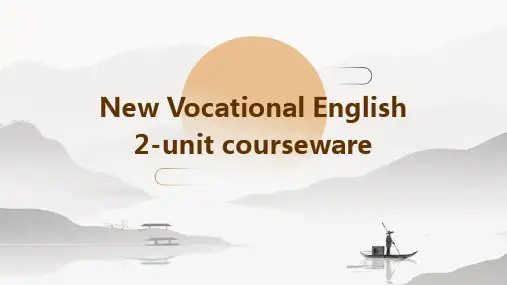

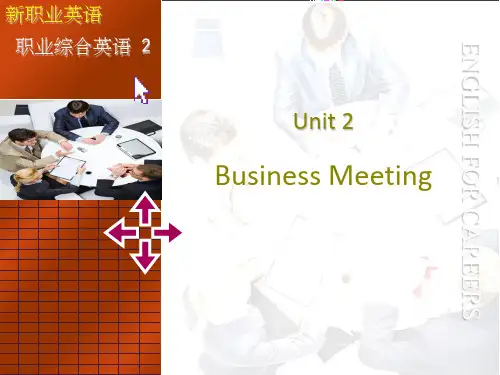
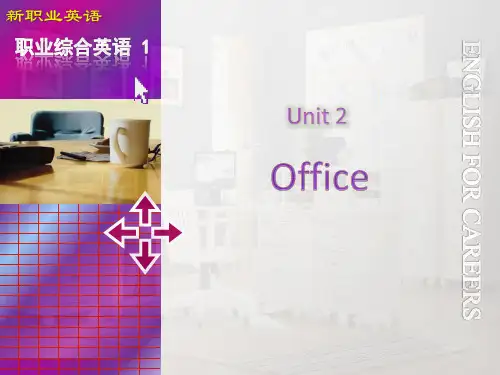
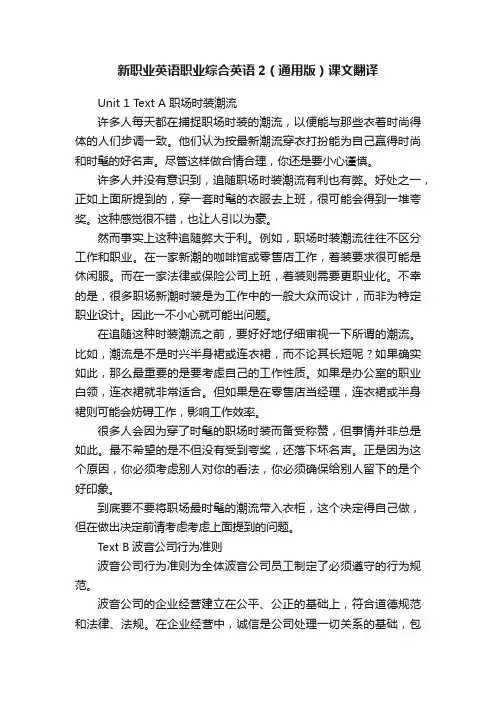
新职业英语职业综合英语2(通用版)课文翻译Unit 1 Text A 职场时装潮流许多人每天都在捕捉职场时装的潮流,以便能与那些衣着时尚得体的人们步调一致。
他们认为按最新潮流穿衣打扮能为自己赢得时尚和时髦的好名声。
尽管这样做合情合理,你还是要小心谨慎。
许多人并没有意识到,追随职场时装潮流有利也有弊。
好处之一,正如上面所提到的,穿一套时髦的衣服去上班,很可能会得到一堆夸奖。
这种感觉很不错,也让人引以为豪。
然而事实上这种追随弊大于利。
例如,职场时装潮流往往不区分工作和职业。
在一家新潮的咖啡馆或零售店工作,着装要求很可能是休闲服。
而在一家法律或保险公司上班,着装则需要更职业化。
不幸的是,很多职场新潮时装是为工作中的一般大众而设计,而非为特定职业设计。
因此一不小心就可能出问题。
在追随这种时装潮流之前,要好好地仔细审视一下所谓的潮流。
比如,潮流是不是时兴半身裙或连衣裙,而不论其长短呢?如果确实如此,那么最重要的是要考虑自己的工作性质。
如果是办公室的职业白领,连衣裙就非常适合。
但如果是在零售店当经理,连衣裙或半身裙则可能会妨碍工作,影响工作效率。
很多人会因为穿了时髦的职场时装而备受称赞,但事情并非总是如此。
最不希望的是不但没有受到夸奖,还落下坏名声。
正是因为这个原因,你必须考虑别人对你的看法,你必须确保给别人留下的是个好印象。
到底要不要将职场最时髦的潮流带入衣柜,这个决定得自己做,但在做出决定前请考虑考虑上面提到的问题。
Text B波音公司行为准则波音公司行为准则为全体波音公司员工制定了必须遵守的行为规范。
波音公司的企业经营建立在公平、公正的基础上,符合道德规范和法律、法规。
在企业经营中,诚信是公司处理一切关系的基础,包括公司与客户的关系、供应商和公众的关系以及员工之间的关系。
在履行公司职责时,波音公司要求员工以最高商业道德标准要求自己。
员工不得参与损害公司诚信、公平、声誉或者为公司带来麻烦的任何活动。
员工应确保:●不参与可能导致公司及个人利益冲突的任何活动。
新职业英语2 unit2新职业英语2 Unit 2In today's fast-paced globalized world, the ability to communicate effectively in English is becoming increasingly important. The demand for employees with strong English language skills is on the rise, and this has given birth to a new kind of English proficiency known as "Business English." Unit 2 of the New Professional English 2 textbook explores the various aspects of this specialized form of English and equips learners with the necessary skills to excel in the business world.Introduction to Business EnglishBusiness English serves as a bridge between the classroom and the workplace. It focuses on teaching students the language and communication skills required in the professional realm. The unit begins by introducing learners to the importance of Business English in today's international business environment.The Language of Job ApplicationsOne crucial aspect of Business English is writing effective job applications. This section of the unit delves into the various components of a job application, such as cover letters and resumes. Students are taught how to tailor their applications to specific job requirements, emphasizing their skills and experiences to stand out from the competition.Business CommunicationClear and concise communication is vital in the business world. In this section, students learn how to effectively communicate through email, letters, and phone calls. They are introduced to common business phrases and expressions, enabling them to convey their messages professionally and assertively.Negotiation SkillsNegotiation is an essential skill in business. This section provides learners with the necessary language and strategies to negotiate successfully. They learn how to express their interests, trade-offs, and reach mutually beneficial agreements. Practical exercises and role-plays further enhance their negotiation skills.Business MeetingsAttending and participating in business meetings is a common occurrence in the corporate world. This section teaches students the language and etiquette required for fruitful interactions during meetings. They learn how to contribute their ideas, express agreement or disagreement, and handle various meeting scenarios.Business PresentationsThe ability to deliver effective presentations is highly valued in the professional world. In this section, learners are taught how to structure and deliver impactful presentations. They learn techniques for engaging the audience, using visual aids, and presenting data effectively.Cross-Cultural CommunicationIn the global business landscape, cultural sensitivity is crucial. This section addresses the challenges of cross-cultural communication and provides strategies to navigate them successfully. Students gain insights into different cultural norms and expectations, allowing them to communicate respectfully and avoid misunderstandings.ConclusionUnit 2 of the New Professional English 2 textbook equips learners with the essential language and communication skills needed to thrive in the business world. From job applications to presentations and cross-cultural communication, students develop the proficiency required to excel in various professional settings. By mastering Business English, individuals can enhance their career prospects and effectively navigate the globalized business environment.。
翻译Unit11.公司所有规章制度都应严格遵守。
(observe)All the pany rules and regulations must be strictly observed.2. 和这些同学在一起我们应随便一些。
(casual)We should be casual when we stay with these students3. 上述所说的是一些在职场环境中非常有用的交际技能。
(setting)The above-mentioned are some munication skills that are very useful in an office setting.4. 我们有一个专业的团队来营销我们的产品。
(professional)We have a professional team to market our products.5. 你知道今秋流行黑衣服吗?(trendy)Do you know black clothes will be trendy this fall?6. 与其求人,不如求己。
(rely on)We would rather rely on ourselves instead of seeking help from others.7. 新车必须符合国家标准。
(ply with)New vehicles must ply with national standards8. 我们公司的一些年轻人可能会来寻求你的建议。
(seek)Some young people in our pany may e to seek your advice.Unit21. 我把咖啡洒了一桌。
(spill)I spilt coffee all over my desk.2. 会上要求我们每个人都提出建议。
(contribute)We were all asked to contributeideas at the meeting.3. 水果在运送时容易腐烂。
新职业英语二unit21、—Where are you going, Tom? —To Bill's workshop. The engine of my car needs _____. [单选题] *A. repairing(正确答案)B. repairedC. repairD. to repair2、It’s windy outside. _______ your jacket, Bob. [单选题] *A. Try onB. Put on(正确答案)C. Take offD. Wear3、My father?is _______ flowers. [单选题] *A. busy watering(正确答案)B. busy waterC. busy with wateringD. busy with water4、The more he tried to please her, _____she seemed to appreciate it. [单选题] *A.lessB.lesserC.the less(正确答案)D.the lesser5、Boys and girls, please _______ your favorite book here and show it to us next class. [单选题] *A. bring(正确答案)B. sellC. buyD. take6、()of the twins was arrested because I saw them both at a party last night. [单选题] *A. NoneB. BothC. Neither(正确答案)D. All7、His father always _______ by subway. [单选题] *B. go to schoolC. goes to bedD. goes to work(正确答案)8、_______ travelers come to visit our city every year. [单选题] *A. Hundred ofB. Hundreds of(正确答案)C. Five HundredsD. Five hundred?of9、When Max rushed to the classroom, his classmates _____ exercises attentively. [单选题] *A. didB. have doneC. were doing(正确答案)D. do10、John had planned to leave but he decided to stay in the hotel for _____ two days because of the heavy rain. [单选题] *A. otherB. another(正确答案)D. others11、Is there ____ for one more in the car? [单选题] *A. seatB. situationC. positionD. room(正确答案)12、I paid twenty yuan _______ the book. [单选题] *A. offB. backC. for(正确答案)D. with13、—Excuse me, how long does it ______ to walk to the library? —About 15 minutes, I’m afraid.()[单选题] *A. take(正确答案)B. spendC. costD. pay14、—______ do you pay for it? —Over the Internet. ()[单选题] *A. WhatB. How muchC. How(正确答案)D. When15、---Excuse me sir, where is Room 301?---Just a minute. I’ll have Bob ____you to your room. [单选题] *A. show(正确答案)B. showsC. to showD. showing16、37.It’s fun _________ a horse with your best friends on the grass. [单选题] *A.to ride (正确答案)B.ridingC.ridesD.ride17、41.—________ do you take?—Small, please. [单选题] *A.What size(正确答案)B.What colourC.How manyD.How much18、74.In England people drive________. [单选题] *A.on the left(正确答案)B.in the leftC.on leftD.in left19、2.I think Game of Thrones is ________ TV series of the year. [单选题] * A.excitingB.more excitingC.most excitingD.the most exciting (正确答案)20、The notice put _______ on the wall says “No Smoking”. [单选题] *A. up(正确答案)B. offC. awayD. out21、—Is this ______ football, boy? —No, it is not ______.()[单选题] *A. yours; myB. your; mine(正确答案)C. your; meD. yours; mine22、The green shorts are _______ sale for $[单选题] *A. forB. on(正确答案)C. atD. with23、73.The moonlight goes ____ the window and makes the room bright. [单选题] * A.acrossB.through(正确答案)C.overD.in24、---Where’s that report?---I brought it to you ____you were in Mr. Black’s office yesterday. [单选题] *A. ifB. when(正确答案)C. becauseD. before25、What he said sounds _______. [单选题] *A. pleasantlyB. nicelyC. friendly(正确答案)D. wonderfully26、We are looking forward to _______ you again. [单选题] *A. seeB. sawC. seeing(正确答案)D. seen27、65.There is a big sale on in the shop! Every-thing is ________ price. [单选题] *A.bigB.fullC.zeroD.half(正确答案)28、Study hard, ______ you won’t pass the exam. [单选题] *A. or(正确答案)B. andC. butD. if29、They all choose me ______ our class monitor.()[单选题] *A. as(正确答案)B. inC. withD. on30、______! It’s not the end of the world. Let’s try it again.()[单选题] *A. Put upB. Set upC. Cheer up(正确答案)D. Pick up。
新职业英语unit2答案【篇一:高职高专_新职业英语_职业综合英语1_练习答案】1 task 11996 : google begun as larry pages research project .recently : google has also owned blogger and other hot websites and become the leader in terms of ad-based revenue on the web .task 4model 11. the wheels appears to be going back when a car is speeding .2. everyone appears to talking about google earth these days .3. no one appeared to have noticed his sadness .model 21. most people dont like the idea that human might be cloned someday .2. but you are trying to cover up the fact that we dont have enough money .3. we have to accept that the goods have been damaged .task 51. all these can not be achieved overnight .2. the gym tends to get very busy at around 6 oclock3. this area is not safe at the moment , so it is better to stay away from it .4. they are one of the top five supermarkets in the area in terms of sales .5. this room has to serve as both bed room and living room .6. the production department is responsible for monitoring the progress of this project .7. the manager was involved in a research on marketing activities last month.8. many big companies now use websites to promote their products and servicestask 31. in addition to ;provides practical experience .2. depends on ; he can to to college or not .3. are expected to ; the meeting ; is held tomorrow4. everyone arrived late ; a variety of5. handle ;she is a careful personp29task 4model 11) she was so weak that she had to go to see a doctor .2) he was so surprised that he could say nothing .3) it was so cold at night , thus i couldnt sleep at all . model 21) the mother didnt leave the room until the child fell asleep2) i didnt know the truth until you told me .we wont start the meeting until bob comes .task 51. a great deal of money has been spent on the new hospital2. success depends on your effort and ability .3. it is difficult to keep tract of the new developments in science and technology .4. all comlaints will be dealt with by the manager .5. dont try doing it yourself , it requires specialized knowledge .6. he was awarded a gold cup for being the best athelete .7. why not turn off tv and do some physical exercise ?8. the annual celebration will be held within the week after the new years daytask 11e 2d 3a 4h 5. i 6. b 7.j8.c9g10 ftask 21. entertaining2. manner3. implied4. urgency5. intelligently6. formal7. conduct8. knowledgeable9. turned out 10. representativetask 31.he has built up a good relationship for his business.2.my little brother was on his best behavior in the summer camp.3. if you have a difficult time, i’ll see you through.4. don’t throw the plastic bags away, as they may come in handy.5. it pays to know what you don’t know.task 4.model 1.1. he did not know where to go.2. we have not decided whether to go there or not.3.i can tell you how to get to the cinema.model 2.1.where is the book which i bought this morning?2.the teacher who teaches you spanish will come tomorrow.3.the woman who is speaking at the meeting is our manager.task 5.1. 在工作中谨慎小心会大有裨益。